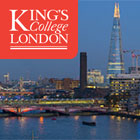More Information
Refund Policy
The fee will be refunded in full only for cancellations received more than 42 days before the short course start date; partial refund can be arranged for cancellations received more than 8 days before the short course start date. Please ensure you read the Short Course Terms & Conditions at https://www.kcl.ac.uk/short-courses/terms-and-conditions.
Further Information
Update as of 2025 for those wanting to apply to be UK CAA Aeromedical Examiners (AMEs)
• The UK CAA has stated that places for new aeromedical examiners (AMEs) are now very limited. Please bear these points in mind when considering whether to undertake this course.
• There are currently about 120 UK CAA AMEs, and the UK CAA does not plan to increase these numbers.
• The UK CAA now estimates it only needs 4-5 new AMEs per year, they are currently only appointed based on "geographical areas of need" and to replace existing AMEs as they retire.
• The UK CAA are oversubscribed with applicants to become AMEs, and there is a backlog of applicants who have already done this course.
• Additionally, if you are interested in attending this course to prepare an AME application to the UK CAA, please ensure that you meet (or will be able to meet) all of the other requirements to apply, which are listed on the UK CAA website about AME Certification Policy here.( https://www.caa.co.uk/aeromedical-examiners/certification-training-and-policy/guidance-on-ame-certification/)
• Note one of the requirement options mentioned on the UK CAA Guidance is an Introduction to Multi-Crew Jet Operations (IMJO) Course, if you wish to find out more about that course one company offering it is Altus Training link (https://altus-training.co.uk/?page_id=589)
This Advanced Course is designed to meet the EASA Part Med AMC2 MED.D.0.20 (a) and (b) training requirements for Class 1 Aeromedical Examiners (AMEs). In the UK parts (c) and (d) of EASA Part Med AMC2 MED.D.0.20 relating to practical training in an AeMC and report of demonstrated competence has traditionally been provided by the UK CAA as part of the application process for Class 1 privileges.
Note, although the course is delivered in line with EASA regulations it is not currently an EASA approved or recognised training course. We are working to gain EASA accreditation but this is not guaranteed.
The course is reviewed and approved by the UK Civil Aviation Authority (CAA) and will provide medical practitioners with the training that is a prerequisite required to apply for authorisation as Class 1 Aeromedical Examiners (AMEs) of flight crew license holders with the UK CAA.
Key benefits
World class learning delivered at a location recognised by the UK Civil Aviation Authority for training of AMEs
Teaching by internationally recognised experts in the field
Conforms to the training requirements of EASA Part Med Subpart D (but is not currently an EASA accredited course)
Course content
The Advanced Course in Aviation Medicine is a unique course in the UK which provides medical practitioners the opportunity to develop the skills required to become AMEs with Class 1 privileges. Currently it is the only course in the UK recognised by the UK CAA as suitable training for those wishing to apply for Class 1 medical certification privileges. This course is taught over 2 weeks full-time face to face.
Learning outcomes
Clinical aviation medicine in the UK is part of the Specialty of Aviation and Space Medicine but there are many different routes to be involved and most civilian practitioners work in aviation medicine as a bolt on special interest from general practice, occupational medicine or any hospital specialism.
Regulatory aviation medicine is based within national or international regulatory authorities, whilst opportunities to work in aviation medicine research occur within national research establishments and industry, or within the armed forces.
Completion of the KCL Advanced Course in Aviation Medicine and success in the examination prepares a medical practitioner for appointment as a Class 1 AME, allowing the medical assessment of student, private and professional pilots and air traffic controllers (with appropriate additional approval from the regulatory authority).
However, it must be stressed that gaining the certificate of success in the Advanced course does not guarantee appointment as a Class 1 AME. This course meets the educational requirements for you to apply for an extension of AME privileges to include Class 1 certification. Each regulatory authority, such as the UK Civil Aviation Authority, appoints AMEs according to need and according to their own criteria (see Civil Aviation Authority policy).
Although the Basic and Advanced courses provide a sound introduction to the principles and practice of aviation medicine, individuals wishing to pursue a career in regulatory or research aviation medicine may wish to consider undertaking the 6 month KCL Post Graduate Diploma in Aerospace Medicine course leading to the Diploma in Aviation Medicine of the Faculty of Occupational Medicine. This provides comprehensive instruction in advanced aviation medicine and prepares medical practitioners to take advantage of career opportunities in research, regulation, industry and the armed forces.
This 2 week full-time course consists of lectures, tutorials and seminars, case studies, in addition to visits to the UK Civil Aviation Authority and also British Airways aircraft simulators.
The course is designed to meet the requirements of EASA Part Med (AMC2 and GM2 MED.D.020) and consists of 66 hours of theoretical and practical training, including specific examination techniques. The learning objectives to acquire the necessary competencies include theoretical knowledge, risk management, and decision-making in the following subjects. Demonstrations and practical skills are included where appropriate.
Pilot working environment
Aerospace Physiology
Clinical medicine
Cardiovascular medicine
Neurology
Psychiatry/psychology
Visual system and colour vision
Otorhinolaryngology
Dentistry
Human factors in aviation
Incidents and accidents, escape and survival
Tropical medicine
There is open access to the directing staff throughout the course and course members are encouraged to discuss individual progress




